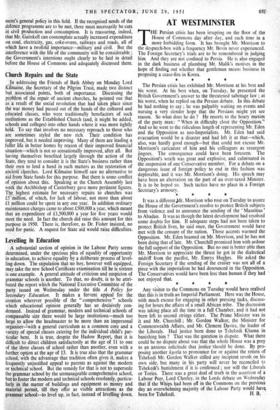Levelling in Education
A substantial section of opinion in the Labour Party seems determined, under the specious plea of equality of opportunity in education, to achieve equality by a deliberate process of level- ling down. The stipulation that no boy, however well equipped, may take the new School Certificate examination till he is sixteen is one example. A general attitude of criticism and suspicion of grammar schools is 'another. To that, no doubt, is to be attri- buted the report which the National Executive Committee of the party issued on Wednesday under the title A Policy for Secondary Education. It makes a fervent appeal for the creation wherever possible of the " comprehensive " schools which educational opinion generally has so decisively con- demned. Instead of grammar, modern and technical schools of compassable size there would be large institutions—much too large to allow the headmaster to be more than an impersonal organiser—with a general curriculum as a common core and a variety of special classes catering for the individual child's par- ticular bent. It is true, despite the Hadow Report, that it is difficult to direct children satisfactorily at the age of 11 to one of the three classes of school rather than another, even with a further option at the age of 13. It is true also that the grammar school, with the advantage that tradition often gives it, makes a frequently unjustified appeal to parents as against the modem or technical school. But the remedy for that is not to supersede the grammar school by the unmanageable comprehensive school, but to foster the modern and technical schools resolutely, particu- larly in the matter of buildings and equipment as money and material permit, till they offer as visible attractions as the grammar school—to level up. in fact, instead of levelling down.


































 Previous page
Previous page